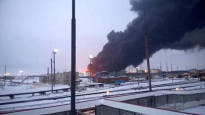The United States has called on Ukraine to stop attacks on Russian energy infrastructure.
A British person told about it on Friday newspaper The Financial Times.
The newspaper bases its news on three anonymous sources who are aware of the discussions between the United States and Ukraine.
According to the paper, Ukraine’s state security service SBU and Ukraine’s military intelligence HUR have received repeated warnings from the White House, which is concerned about Russia’s possible reaction to the attacks.
– We do not encourage or enable attacks on Russian soil, a spokesman for the US National Security Council commented to the Financial Times.
Ukraine has carried out at least 15 drone attacks on 13 fuel refineries this year, the Association of Investigative Journalists The Insider went down in March.
Turku University of Economics professor and Russia researcher Kari Liuhto tells that the West fears that the attacks will raise the price of crude oil in the world and provoke Russia into retaliation.
– It is certain that the price of oil will rise. It will also be visible at our gas pumps.
According to Liuhto, the rise in the price of oil for the United States is particularly annoying, because Americans fear that the increase in the price of gasoline will affect the outcome of the US presidential election.
– Above all, a sitting president Joe Biden don’t want this.
Russia attacked Ukraine’s energy grid
Liuhto does not believe that drone attacks could lead to larger Russian counterattacks.
– I don’t think that the strikes in Ukraine exceed the threshold for using Russian tactical nuclear weapons. Or that Russia would attack the Zaporizhia nuclear power plant more.
According to Liuhto, the fear of retaliatory strikes is pointless, because Russia is carrying out retaliatory strikes even now.
On Friday, Russia launched the largest attack of the war so far against Ukraine’s energy infrastructure. It struck Ukraine with more than 60 drones and more than 90 missiles.
Liuhto considers it likely that it was revenge for Ukraine’s drone attacks on Russian oil refineries at the beginning of the year.
Russia itself needs oil
Spokesperson for the Russian administration, the Kremlin Dmitry Peskov said on Friday that Russia is waging war against the West.
In the past, Russia has called its war of aggression a special operation in Ukraine.
Liuhto considers the change in rhetoric to be significant and predicts that Russia will launch a major attack by the end of the summer at the latest. For its attack, Russia now needs oil products itself.
According to Liuhto, the motive for the attacks in Ukraine has been to delay a possible new attack by the Russians, not to destabilize the Russian economy by influencing the oil trade.
The attacks in Ukraine have crippled about a tenth of Russia’s oil production capacity.
Russia’s oil exports have dropped by twenty percent, which, according to Liuhto, practically means that Russia is currently cutting back on exports.
The demand for oil has not decreased
According to Professor Kari Liuhto, the amount of Russian oil on the market is reduced by the fact that the country pledges oil to transport the equipment of the Russian army.
– Russia accounts for 10 percent of the international oil trade. If that share disappears from the world market, the price of oil will inevitably rise around the world, he explains.
As a result of the drone attacks in Ukraine at the beginning of the year, the world market price of oil has already risen.
For example, according to the news agency Reuters, in March the price of Brent oil futures rose for the first time since November to over 85 dollars per barrel. According to the Financial Times, the price of oil has risen by around 15 percent this year.
However, according to the expert, the rise in oil prices is not solely due to the attacks in Ukraine or fears related to Russian retaliation.
– Usually the market overreacts, at least in the initial phase. Now the situation in Iran, the Huthi attacks in the Red Sea and the situation in the Middle East in general are also affecting, Liuhto says.
We don’t want disruptions to world trade
Russia’s biggest trading partners are China, Turkey and India. In addition, EU countries such as Slovakia and Hungary still purchase Russian oil.
Russia’s biggest trading partner is China, which buys half of Russian energy.
According to Liuhto, the West could get Russian oil completely off the market if it wanted to. Western intelligence has very precise information about which terminals the oil going to Turkey and China is processed at.
– But this will hardly ever be done, because the West does not want a trade war with China, Liuhto estimates.
Source: Reuters
